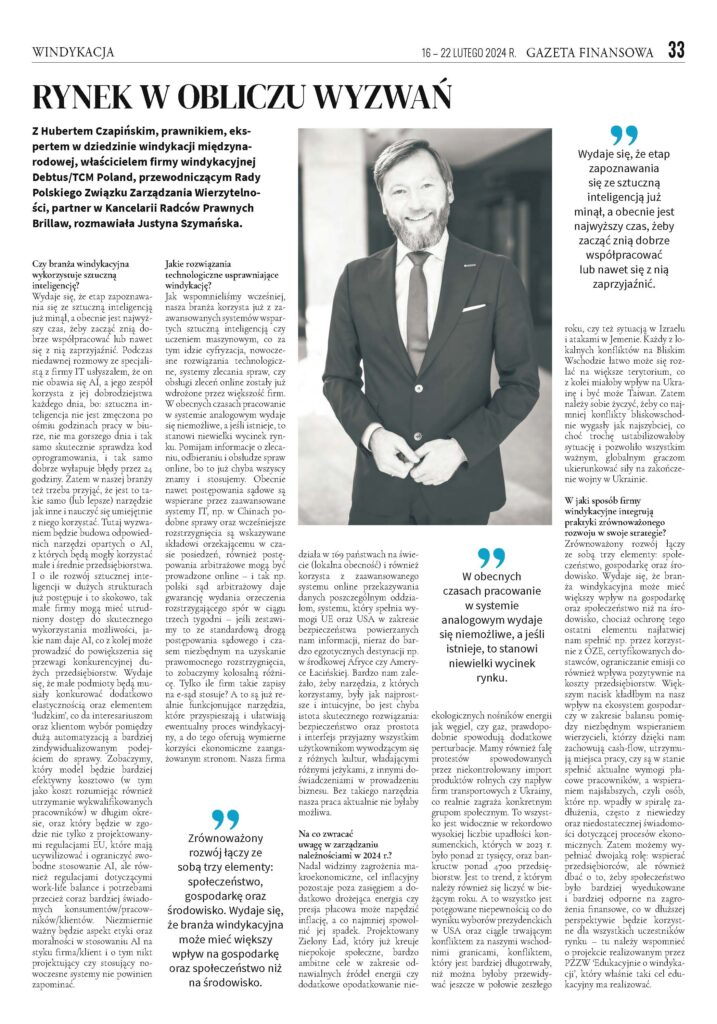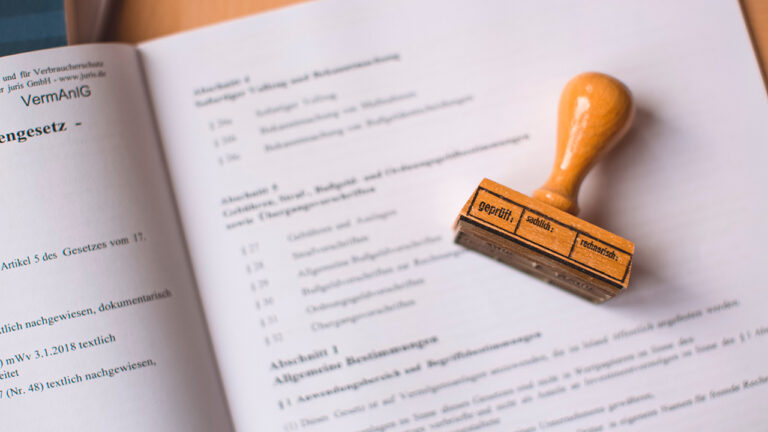Breaking Down the Debt Collection Market: Unveiling the Current Challenges
Discover insights from Mr. Hubert Czapiński, a renowned debt collection expert at Expert Planet, as he discusses the challenges anticipated in the debt collection market during an interview featured by the Financial Gazette, delves into the imminent impact of AI and technology on the debt collection business. Gain valuable knowledge on navigating the evolving landscape of AI in this dynamic industry. Read the complete interview to understand how to adapt to the new era shaped by artificial intelligence.
The interview content was originally published in Polish, and we now present the English version for your reference. Following is the full interview content:
It seems that the stage of getting to know artificial intelligence has already passed and now it is high time to start working well with artificial intelligence or even become friends with it.
Nowadays, working in an analog system seems impossible, and if it exists, it is a small part of the market.
Sustainable development combines three elements, society, economy, and environment. It seems that the debt collection industry may have a greater impact on the economy and society than on the environment.

Artificial intelligence in debt collection – fashion or necessity?
It seems that the stage of getting to know artificial intelligence has already passed and now it is high time to start working well with artificial intelligence or even become friends with it. During a recent conversation with a specialist from an IT company, I heard that he is not afraid of AI, and his team uses its benefits every day, because: ‘artificial intelligence is not tired after 8 hours of work in the office, it does not have a bad day and is just as effective, checks software code, and catches errors just as well for 24 hours’. Therefore, in our industry we also need to assume that it is the same (or better) tool as any other and learn to use it skillfully. The challenge here will be to build appropriate AI-based tools that can be used by small and medium-sized enterprises. And while the development of artificial intelligence in large structures is already progressing in leaps and bounds, small companies may have difficult access to the effective use of the opportunities offered by AI, which in turn may lead to an increase in the competitive advantage of large enterprises. It seems that small entities will have to compete additionally with flexibility and the ‘human’ element, which will give stakeholders and customers a choice between high automation and a more individualized approach to the matter. We will see which model will be more cost-effective (including the cost of maintaining qualified employees) in the long term, and which will be in line not only with the proposed EU regulations that are intended to civilize and limit the free use of AI, but also with regulations regarding work-life balance and the needs of increasingly aware consumers/employees/customers. The aspect of ethics and morality in the use of AI at the company/customer interface will be extremely important, and no one designing or using modern systems should forget about this.
Technological solutions that improve debt collection, digitization, and functionality in the offer of debt collection companies, online debt collection – effective solutions in new times?
As we mentioned earlier, our industry already uses advanced systems supported by artificial intelligence or machine learning, and therefore digitization, modern technological solutions, case assignment systems and online order processing have already been implemented by most companies. Nowadays, working in an analog system seems impossible, and if it exists, it is a small part of the market. I am omitting information about ordering, receiving and handling matters online, because we probably all know and use this already. Nowadays, even court proceedings are supported by advanced IT systems, e.g. we heard that in China, similar court cases and previous decisions are presented to the adjudicating panel during meetings, and arbitration proceedings in Poland can also be conducted online – for example, the Polish arbitration court guarantees the issuance of an award resolving the dispute in within 3 weeks – if we compare it with the standard course of court proceedings and the time necessary to obtain a final decision, we will see a colossal difference. But how many companies use such e-court proceedings? And these are already functioning tools that speed up and facilitate the possible debt collection process and offer measurable economic benefits to the parties involved. Our company operates in 169 countries around the world (local presence) and also uses an advanced online system for transmitting data to individual branches, a system that meets EU and US requirements regarding the security of information entrusted to us, sometimes to very exotic destinations, e.g. in Central Africa or Latin America. We really wanted the tools we use to be as simple and intuitive as possible, because this is probably the essence of an effective solution: security, simplicity, and an interface friendly to all users coming from different cultures, speaking different languages, and with different experiences in conducting a business. Without such a tool, our work would currently not be possible.
What to pay attention to when managing receivables in 2024.
We still see macroeconomic threats, the inflation target remains out of reach, and additionally rising energy prices or wage pressure may drive inflation, or at least slow down its decline. The planned European Green Deal, which is already creating social unrest, very ambitious goals in the field of renewable energy sources and additional taxation of non-ecological energy carriers such as coal or gas, will probably cause additional perturbations. We also have a wave of protests caused by the uncontrolled import of agricultural products or the inflow of transport companies from Ukraine, which pose a real threat to specific social groups. All this is evident in the record-high number of consumer bankruptcies in 2023. there were over 21,000, and bankruptcies of over 4,700 enterprises. This is a trend that should also be taken into account this year. And all this is intensified by the uncertainty about the result of the US presidential elections and the ongoing conflict beyond our eastern borders, a conflict that is more long-lasting than could have been predicted in the middle of last year, or the situation in Israel and the attacks in Yemen. Any local conflict in the Middle East could easily spill over into a larger territory, which in turn would affect Ukraine. Therefore, it is to be hoped that at least the Middle Eastern conflicts would end as soon as possible, which would stabilize the situation at least a little and allow all important global players to direct their forces to end the war in Ukraine.
How do debt collection agencies integrate sustainability practices into their strategies?
Sustainable development combines three elements: society, economy, and environment. It seems that the debt collection industry may have a greater impact on the economy and society than on the environment, although it is easiest to protect the latter element, e.g. by using renewable energy sources, certified suppliers, and reducing emissions, which also has a positive impact on enterprise costs. I would put more emphasis on our impact on the economic ecosystem in terms of the balance between the necessary support for creditors who, thanks to us, maintain cash flow, maintain jobs, and are able to meet the current wage requirements of employees, and supporting the weakest, i.e. people who entered into a debt spiral, often due to ignorance and insufficient awareness of economic processes. Therefore, we can fulfill a dual role: supporting entrepreneurs, but also ensuring that society is more educated and more resistant to financial threats, which in the long run will be beneficial for all market participants – here it is worth mentioning the project implemented by Polish Credit Management Association ‘Educational about debt collection ‘, which is intended to achieve this educational goal.







